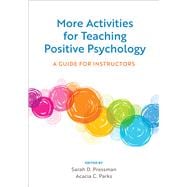More Activities for Teaching Positive Psychology features brand new expert-informed resources for teachers and coaches.
No two positive psychology courses are the same, nor is there one best way to teach the content that is critical to this rapidly growing course. This practical, flexible workbook for instructors and coaches teaching positive psychology features 30 activities divided into conceptual explorations, experiments, and self-reflections.
This new volume, a follow-up to Activities for Teaching Positive Psychology, includes all new material, including exercises for important classic key topics in positive psychology such as improving well-being, meaning making, gratitude, self-compassion, kindness, resilience, positive emotion, purpose, and strengths. This book also includes emerging topics like the interactions between positive psychology and facial expressions and the effects of technology and nature on happiness. Concise and well-organized, this is a perfect teaching resource for class activities and course preparation.








